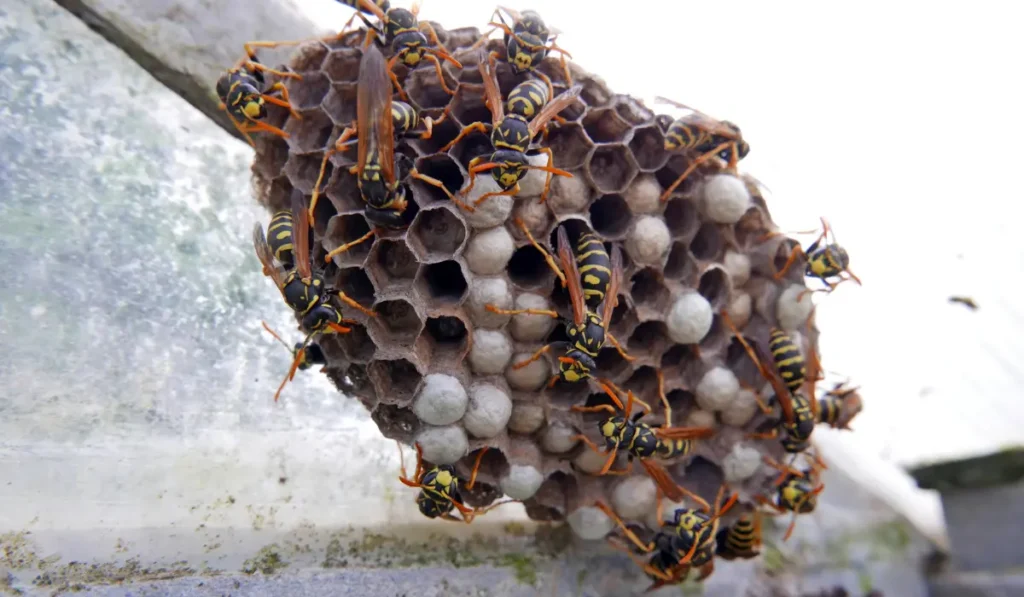
If you’ve ever had to dodge a wasp during a backyard cookout, you know how stressful it can be. Wasps can build nests in all kinds of spots, like under eaves, in attics, or even inside wall voids. When they settle in close to your home, they become a real problem fast.
This article explains how to get rid of wasps in Alabama in a way that keeps you and your family safe. We’ll also cover why it’s best to leave wasp nest removal to the pros, not a DIY project.
Key Takeaways
- Wasps in Alabama include yellow jackets, paper wasps, mud daubers, and bald-faced hornets that behave in different ways.
- Trying to remove a wasp nest yourself can lead to painful stings and serious allergic reactions for some people.
- Food scraps and open spaces like eaves, attics, and wall gaps make your home a good nesting place for wasps.
- A pest control company can remove nests safely and keep pollinators like honey bees from being harmed during treatment.
Know What Kind of Wasp You’re Dealing With
Alabama has many types of wasps. The most common ones are yellow jackets, paper wasps, mud daubers, and bald-faced hornets. These flying insects all act a little differently. For example:
- Red Paper wasps make papery nests in open spots like overhangs or eaves.
- Yellow jackets tend to build nests in the ground or inside walls.
- Hornet nests, like those made by bald-faced hornets, are often shaped like big gray balls and hung high up.
- Mud daubers make long, narrow nests out of mud, often found in sheds or garages.
Knowing which species of wasps you’re dealing with helps you figure out the risk and why you shouldn’t try to remove the nest yourself.
Don’t Try to Remove the Nest Yourself
DIY wasp control might seem like a good idea, but it’s not safe.
Online tricks like using dish soap spray or peppermint oil might kill a few wasps, but they won’t solve the problem. Worse, they could make the whole nest angry.
If they feel threatened, they’re quick to swarm and sting.
A single stinger can leave a painful sting, and some wasps, like yellow jackets, can sting more than once. That’s especially dangerous if someone nearby has allergic reactions to wasp stings.
Even wearing protective clothing isn’t enough to keep you safe if a whole nest comes after you.
Get Rid of What’s Attracting Them
Wasps go where the food is.
They’re drawn to things like sweet drinks, meat, open trash cans, pet food, and even caterpillars in your garden. These food sources help them feed their young.
To cut down on wasp activity, clean up spills, keep lids on garbage cans, and don’t leave food out. This kind of pest management won’t remove an existing nest, but it can keep a wasp infestation from getting worse.
Seal Up Their Favorite Nesting Spots
Wasps love quiet, protected areas. Places like attics, eaves, overhangs, and wall voids are perfect for starting a new nest.
Homeowners should check around the house and seal up small gaps, cracks, and vents to make it harder for wasps to get in.
Once a nest forms, removing it without proper tools or protective gear is risky. Even after a nest is gone, wasps may return if the scent or nesting site isn’t cleaned properly.
Call a Local Exterminator
If you see signs of a wasp nest, or worse, get stung, it’s time to call a pest control company. Professionals use the right wasp spray, repellent, and tools to remove nests safely. They wear proper protective gear and know how to treat tricky areas like hornet nests in trees or yellow jacket nests underground.
At Magic City Pest Control, we specialize in wasp control in Birmingham and nearby Alabama towns. With years of experience in Alabama pest control services, our team knows how to handle all the common types of wasps. We can remove the nest and help stop new wasps from coming back. And we always work to protect helpful pollinators like honey bees while targeting the real threat.
Need help with wasps?
Contact us now for safe, fast, and professional wasp nest removal and pest control services.

